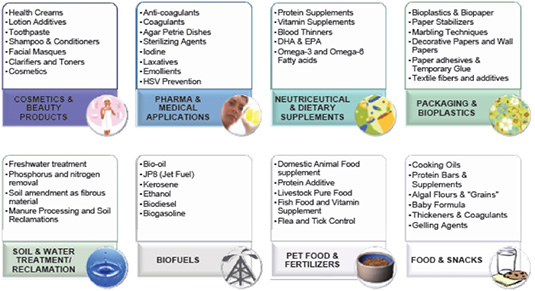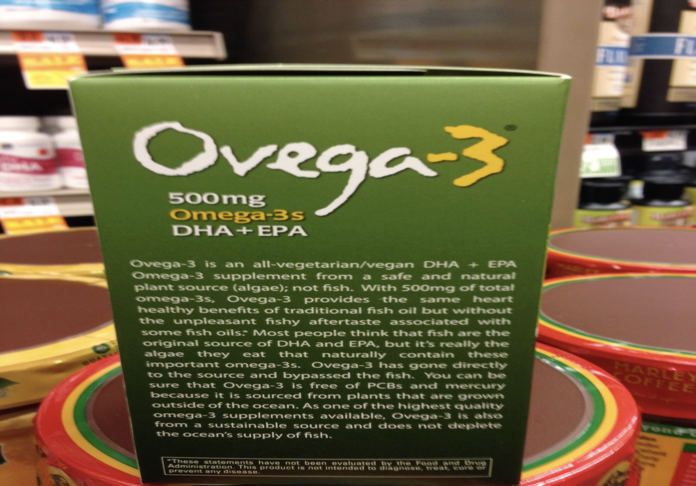- Algasol PBRs produce at least 10 times more protein per area than soybeans and do so more economically. This, alone, holds the potential of the next Green Revolution.
- Algasol’s patented growth system needn’t use land at all. In fact, it prefers saline water areas such as the oceans, which comprise 2/3 of Earth’s surface. i.e. ILUC is not an issue. The environmentalist dream of rewilding biodiverse habitats becomes economic.
- Algae actively sequesters CO2.
- Algal biomass has many end applications. Please see below end applications.
- The algae industry creates jobs in various sectors all around the world.
- Algasol enables access to numerous multibillion dollar industries, including:
animal feed (fishmeal), nutraceuticals (DHA/EPA omega-3s), and pharmaceuticals

OMEGA – 3
The Omega-3 in fish oil comes from the algae that they eat. Why not bypass the middle man? Omega-3 from algae is an all-vegetarian-vegan DHA+EPA supplement from a safe and natural plant source (algae); not fish. Providing the same heart healthy benefits of traditional fish oil but without the unpleasant fishy aftertaste associated with some fish oils. Since the original source of DHA and EPA, is really the algae that the fish eat that naturally contain these important Omega-3s, Omega-3 directly from algae is a more efficient source. An added benefit is that it is free of PCBs and mercury because it is sourced from plants (algae) that are grown in closed growth systems, i.e Algasol’s unique closed patented PBRs. At the same time, it does not deplete the ocean’s supply of fish, which unfortunately occurs with current fish feed sourced from smaller fish like anchovies etc.

CARBON SEQUESTRATION
Current agricultural practices deforest land areas, resulting in the release of enormous amounts of CO2 into the atmosphere. The world has to search and push for active carbon sequestration. Reforestation becomes practical by reducing the land requirements for protein photosynthesis with Algasol’s PBRs. Moreover algae itself is a valuable carbon offset.

Algae – the long term future:
Algae is potentially the best feedstock for next generation biofuels
The current biofuel industry is based almost exclusively on food and terrestrial crops. However, many non-governmental organizations and scientists are criticizing current developments.
- Simply speaking, there is just not enough land to provide both food and fuel and this is especially true for oil crops.
- Plantations for biofuels lead to increased deforestation of tropical forest and accelerate the loss of our unique biodiversity.
- The increase of food prices is impacting the poorest of the world.
Algae alleviate many of the problems related to terrestrial sourced biofuels.
- Algae can be grown in Algasol’s patented PBRs both on land and in the oceans.
- Agricultural land is not a requirement for production of algae biomass in Algasol´s PBRs, i.e ILUC is not an issue.
- Algae can reach yields that are more than 10 times higher than even then the most productive current crops.
- Algae sequester large amounts of carbon dioxide as they grow.
Scientists estimate that there are more than 100,000 micro algae species allowing us a rich opportunity to find the optimal species depending on the chosen product, location and other factors. Many attempts have already been made to grow algae, but none of them have successfully reached industrial-scale production. The main reason for this is the lack of a technology for the production of algae biomass with low investment and operating cost, no contamination and high efficiency.
Algasol has developed and patented a low-cost PhotoBioReactor technology, which significantly reduces the production cost of micro algae biomass, while at the same time avoid contamination, which is a common problem in other low-cost systems combined with the use of arable land. More about technology »
